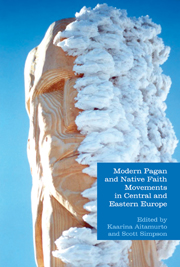Book contents
- Frontmatter
- Contents
- Contributors
- 1 Introduction: Modern Pagan and Native Faith Movements in Central and Eastern Europe
- Part I Overviews
- Part I Country Studies
- 6 Contemporary Paganism in Lithuanian Context: Principal Beliefs and Practices of Romuva
- 7 The Dievturi Movement in Latvia as Invention of Tradition
- 8 Polish Rodzimowierstwo: Strategies for (Re)constructing a Movement
- 9 Ukrainian Paganism and Syncretism: “This Is Indeed Ours!”
- 10 Russian Rodnoverie: Six Portraits of a Movement
- 11 Czech Neopagan Movements and Leaders
- 12 Neopaganism in Slovenia
- 13 Bulgarian Society and the Diversity of Pagan and Neopagan Themes
- 14 Romanian Ethno-Paganism: Discourses of Nationalistic Religion in Virtual Space
- 15 Neopaganism in Hungary: Under the Spell of Roots
- 16 Neopaganism in the Mari El Republic
- 17 A Neopagan Movement in Armenia: The Children of Ara
- Part III Thematic Studies
- Bibliography
- Index
16 - Neopaganism in the Mari El Republic
from Part I - Country Studies
- Frontmatter
- Contents
- Contributors
- 1 Introduction: Modern Pagan and Native Faith Movements in Central and Eastern Europe
- Part I Overviews
- Part I Country Studies
- 6 Contemporary Paganism in Lithuanian Context: Principal Beliefs and Practices of Romuva
- 7 The Dievturi Movement in Latvia as Invention of Tradition
- 8 Polish Rodzimowierstwo: Strategies for (Re)constructing a Movement
- 9 Ukrainian Paganism and Syncretism: “This Is Indeed Ours!”
- 10 Russian Rodnoverie: Six Portraits of a Movement
- 11 Czech Neopagan Movements and Leaders
- 12 Neopaganism in Slovenia
- 13 Bulgarian Society and the Diversity of Pagan and Neopagan Themes
- 14 Romanian Ethno-Paganism: Discourses of Nationalistic Religion in Virtual Space
- 15 Neopaganism in Hungary: Under the Spell of Roots
- 16 Neopaganism in the Mari El Republic
- 17 A Neopagan Movement in Armenia: The Children of Ara
- Part III Thematic Studies
- Bibliography
- Index
Summary
THE LAST PAGAN NATION?
The Mari are a Volga Finnic people found in a small geographic area of the Russian Federation. Mari intellectuals often call their people the “last Pagan nation of Europe” and present this as a source of national pride. This claim, that the Mari are a pillar of Paganism, has some grounds. Well into the eighteenth and nineteenth centuries, the Mari preserved many of their old folk rituals, habits, myths and legends, everyday practices, and customs. At least in comparison with their neighboring ethnic groups in the European north of Russia in the Volga and Ural regions—such as the Komis, Mordvas, Chuvash, Udmurts, Besermjans, Volga Tatars, and Bashkirs—it is clear that the Mari have more archaic spiritual traditions.
At the beginning of the twentieth century the Russian ethnographer Dmitriĭ Zelenin marveled at how Mari women worked in the fields in the July heat with tightly wrapped feet and without removing their national costume, which includes a big, heavy head-dress. In the Mari people, Zelenin found the manifestation of an exceptionally strong sense of national identity and commitment to one's own tradition. “Fearing and detesting all that is Russian, they say, ‘to kill our faith means to kill us,’ and about their Pagan prayers in the forest [they say]: ‘if we cease to go to the forest, we will die, our whole tribe will become extinct’.”
- Type
- Chapter
- Information
- Publisher: Acumen PublishingPrint publication year: 2013



